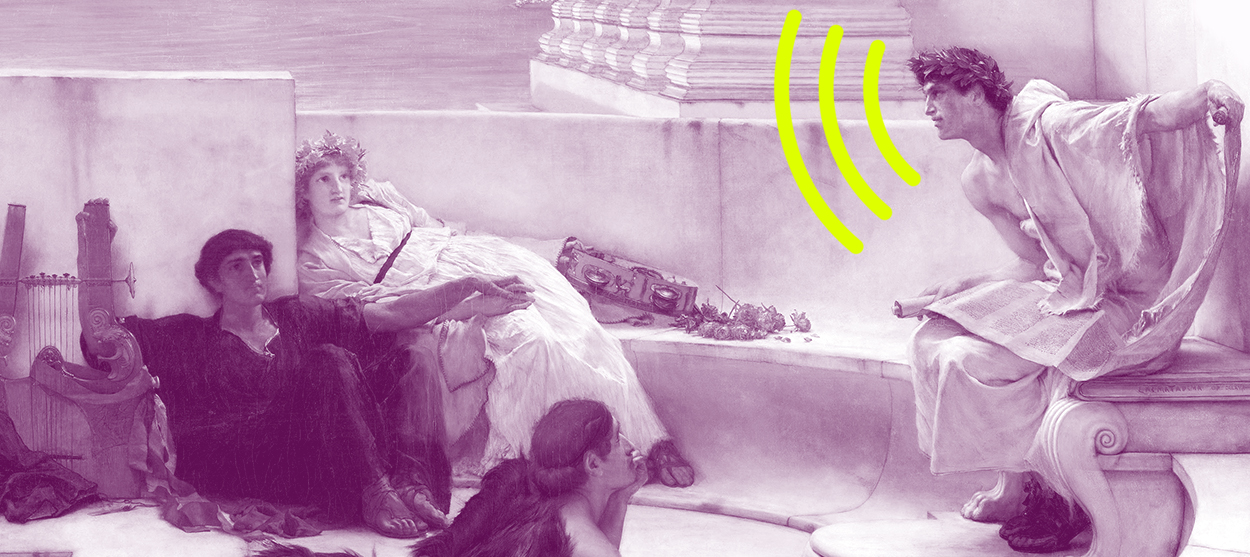Tell me a story
How the rise of audiobooks connects with our long history of oral storytelling

A free daily email with the biggest news stories of the day – and the best features from TheWeek.com
You are now subscribed
Your newsletter sign-up was successful
Society tends to be divided about the merit of audiobooks. Some argue they're no different than physical books. Others are staunch opponents to them, even going so far as to suggest they're linked to a decline in literacy. And even if you're not opposed to books on tape, you likely harbor a quiet assumption that listening to a story is, well, lazy. But audiobooks are just a modern incarnation of a tradition that's older than civilization itself: the act of listening to the voice of another human telling us a story.
We may think reading is the purest form of engaging with a story, but in reality, humans were listening to stories long before we were reading them.
Take, for example, The Iliad and The Odyssey, the two works considered the fountainheads of our literary tradition. The Odyssey, in particular, is a patchwork of several older oral poems that have been put together to form a written whole. Poems like these were usually recited by "singers" or "rhapsodes," often slaves who entertained during meals and games. Once The Iliad and The Odyssey were written down, they became fixed and developed into historical works of reference and helped form a cultural identity throughout the Greek world.
The Week
Escape your echo chamber. Get the facts behind the news, plus analysis from multiple perspectives.

Sign up for The Week's Free Newsletters
From our morning news briefing to a weekly Good News Newsletter, get the best of The Week delivered directly to your inbox.
From our morning news briefing to a weekly Good News Newsletter, get the best of The Week delivered directly to your inbox.
Next, consider the seventh-century Early English poem Beowulf and its very first word: Hwæt! Literally, "hwæt" means "what," but as the first word of a poem, the purpose of "hwæt" is to alert people to pay attention to the story. Does this mean that Beowulf was an oral story put into writing? Not necessarily, according to Roy Michael Liuzza, professor of English at University of Tennessee Knoxville. Beowulf was originally created in writing, but the use of "hwæt" shows that to appreciate the story, the reader and the listener needed to act as if it was an oral story, similar to how "Once upon a time" puts us in the right frame of mind to hear a fairy tale. This type of oral reception creates a shared virtual orality, which Liuzza explains to The Week as "the creation of an illusion of an oral world even when poems are written by authors and read from books."
During the Middle Ages we begin to see an overlap between writing, listening, reading, and improvisation. The oldest work of literature written in the Swedish vernacular is The Chronicle of Duke Erik from c. 1320. Created as a work of written history, the chronicle comes with instructions to read it as entertainment at dinnertime. What's more, the chronicle is written in rhyme to make it easier for the listener to follow along and remember what they've heard. In medieval Iceland, the poet, or skald, was held in high esteem. The skald's reputation depended on how quickly he could come up with a complicated poem on the spot in front of an audience. How do we know this? The Icelandic sagas, written down in the 13th century, tell us about cutthroat improvised poetry competitions as entertainment and a way of jockeying for position.
The idea that reading a text in solitude is the only way to engage with literature is a recent one. Throughout most of human history, those who could read or write belonged to the elites. During the early Middle Ages, people who could read or write were mainly members of the clergy or a monastic order. Later during the Middle Ages, literacy spread throughout the social groups. The merchants in towns and cities learned how to read or write, as did women. But it was not until the introduction of the printing press in the 15th century that books became more widely available. With the requirement within Protestantism that parishioners should be able to read the Bible themselves, solitary reading became more widespread until it took over as the only way to engage with stories when compulsory schooling brought literacy to the masses.
Audiobooks present a return to oral storytelling, but in the digital age things are a bit different. Instead of listening to a story as part of a group, audiobooks encourage solitary listening. Are audiobooks bad for literacy? Research suggests that when we listen to a story, we retain less information than when we read in silence. On the other hand, brain scans show that when we listen to a story, we react the same way emotionally as when we read it. Listening to a story comes naturally to us, while reading is a cognitive skill we must acquire and practice. When we read a particularly difficult text, our tongues move as if we are reading it out loud.
A free daily email with the biggest news stories of the day – and the best features from TheWeek.com
Humans connected with one another through stories, but there is no single way of engaging with a story. Throughout history, stories have been spoken and written. They have been read in silence and out loud, in solitude and in groups. With audiobooks, all of these things come together in one.
Want more essential commentary and analysis like this delivered straight to your inbox? Sign up for The Week's "Today's best articles" newsletter here.